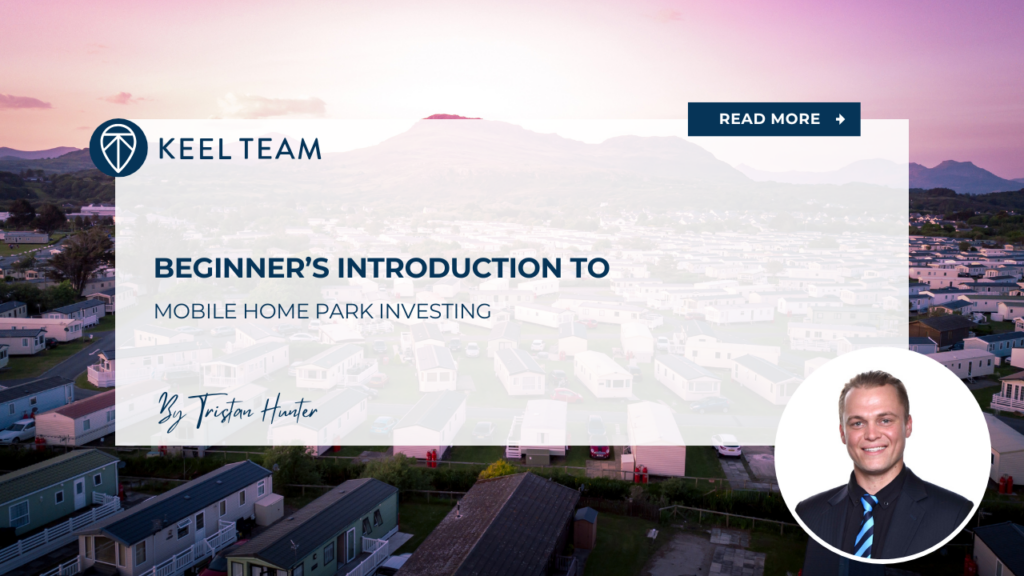Beginner’s Introduction to Mobile Home Park Investing
-
 Tristan Hunter - Investor Relations
Tristan Hunter - Investor Relations

Mobile home park investing has gained popularity in recent years. With the rising demand for affordable housing and limited supply in many regions, mobile home parks may offer unique opportunities for investors looking to diversify their portfolios. This article serves as a beginner-friendly guide for those considering their first steps into mobile home park investing.
What Is a Mobile Home Park?
A mobile home park is a property that provides space for mobile homes or manufactured homes. These homes are typically owned by the residents, while the land beneath them is leased from the park owner. In some cases, the park owner may also own some of the homes and rent them out. This model creates multiple potential income streams, depending on how the investment is structured.
Download our FREE eBook on the Top 20 things to know BEFORE investing in mobile home parks!
Why Consider Mobile Home Park Investing?
Mobile home park investing can appeal to beginners for several reasons. While no investment is without risk, mobile home parks often present a different set of dynamics compared to traditional real estate assets like single-family rentals or apartment complexes.
1. Affordable Housing Demand
Across the U.S., affordable housing remains in short supply. Mobile home parks may help fill this gap, offering lower-cost housing options in both urban and rural areas. Investors might see opportunities in this consistent demand.
2. Lower Tenant Turnover
Since many residents own their homes, they are often less likely to move. Relocating a mobile home can be expensive and difficult. This means tenants may stay longer, which might reduce turnover-related costs for the park owner.
3. Simplified Maintenance (In Some Cases)
When tenants own their mobile homes, they usually handle their own home maintenance. As a result, park owners may only need to maintain the common areas and infrastructure like roads, utility lines, and landscaping. This can reduce overall management complexity, though it still requires attention and proper planning.
Key Concepts for Beginners Entering Mobile Home Park Investing
Before investing in a mobile home park, it helps to understand several core concepts that shape this asset class.
Lot Rent vs. Home Rent
As a mobile home park owner, you can earn income in two main ways:
- Lot Rent: You lease the land to mobile home owners. This tends to be more passive, as the tenants are responsible for maintaining their own homes.
- Home Rent: You own the homes and rent them to tenants. This typically involves more maintenance, oversight, and management.
Many beginner investors gravitate toward lot rent-only models because they are often more hands-off. However, each approach has pros and cons depending on your goals and risk tolerance.
Infrastructure Matters
When analyzing mobile home park deals, it’s crucial to evaluate the condition and type of infrastructure. Common considerations include:
- Water and Sewer: Public utilities are usually preferred, but some mobile home parks use private wells or septic systems.
- Electric and Gas: Check whether utilities are individually metered or master-metered.
- Roads and Drainage: Poor infrastructure can lead to costly repairs.
Due diligence on infrastructure can help you better estimate ongoing expenses and future capital needs.
Occupancy and Rent Collections
High occupancy and consistent rent collections are often signs of a well-run mobile home park. As a beginner, it may be helpful to focus on properties with stable, paying tenants rather than turnaround projects—at least initially. However, every deal is different, and value-add opportunities may also exist depending on your strategy and resources.
How to Find Mobile Home Park Deals
Finding mobile home park investments may require a different approach than finding single-family homes or apartments.
Brokers and Online Listings
Several commercial brokers specialize in mobile home parks. Sites like LoopNet, Crexi, and mobilehomeparkstore.com list parks for sale across the country. While online listings can help you get a feel for pricing and market trends, competition can be high.
Direct Outreach
Some investors contact mobile home park owners directly to inquire about off-market sales. This method takes more time and effort but can lead to better deals and less competition.
Networking
Join mobile home park investing groups, attend conferences, or connect with experienced investors. Many people are willing to share insights, and some may even offer joint venture opportunities to new investors.

Financing Your First Mobile Home Park
Financing a mobile home park may not always be as straightforward as financing a single-family rental. However, several financing options are typically available:
- Seller Financing: Sometimes the current owner is willing to finance the sale. This can be helpful for new investors who may struggle to get traditional loans.
- Local Banks or Credit Unions: Smaller banks may be more willing to finance mobile home parks than large national lenders.
- Commercial Loans: These loans are based more on the property’s performance than the borrower’s personal finances.
- Agency Loans (Fannie/Freddie): For larger or stabilized mobile home parks, government-sponsored loan programs may be available.
Each financing method has pros and cons, and beginners should evaluate terms carefully, especially around interest rates, down payments, and loan durations.
Managing a Mobile Home Park
Management plays a crucial role in the success of a mobile home park investment. Some beginners choose to self-manage, especially with smaller parks. Others hire third-party property managers who specialize in mobile home parks.
Key management responsibilities may include:
- Rent collection and lease enforcement
- Maintenance of roads, common areas, and utility systems
- Handling tenant concerns or disputes
- Staying compliant with local and state regulations
Whether you self-manage or hire help, staying responsive and professional tends to go a long way in maintaining tenant satisfaction and park stability.
Risks to Be Aware Of
Like all investments, mobile home park investing carries risks. While some investors have found strong returns, beginners should approach this asset class with a full understanding of the potential downsides.
- Deferred Maintenance: Some mobile home parks may have years of neglected infrastructure, leading to high upfront costs.
- Tenant Relations: Even if tenants own their homes, disputes can arise. Evictions and enforcement actions still require time and money.
- Zoning and Regulations: Some municipalities have strict rules about mobile home parks. New development is often limited, and existing parks may face scrutiny.
- Market Conditions: Local economic shifts can affect occupancy rates, rent levels, and property values.
Conducting thorough due diligence and stress-testing your assumptions can help mitigate some of these risks.
Final Thoughts
Mobile home park investing may offer beginners a way to get involved in real estate with potentially lower competition and higher yields. However, success depends on doing your homework, running the numbers, and understanding the unique aspects of this asset class.
For those willing to learn and stay involved, mobile home parks might provide a path to steady, long-term income. Just remember—there are no guarantees in real estate, and every property and market comes with its own set of variables.
Are you looking for MORE information? Book a 1-on-1 consultation with Andrew Keel to discuss:
- A mobile home park deal review
- Due diligence questions
- How to raise capital from investors
- Mistakes to avoid, and more!
Disclaimer:
The information provided is for informational purposes only and is not investment advice or a guarantee of any kind. We do not guarantee profitability. Make investment decisions based on your research and consult registered financial and legal professionals. We are not registered financial or legal professionals and do not provide personalized investment recommendations.

Tristan Hunter - Investor Relations
View The Previous or Next Post
Subscribe Below 👇





